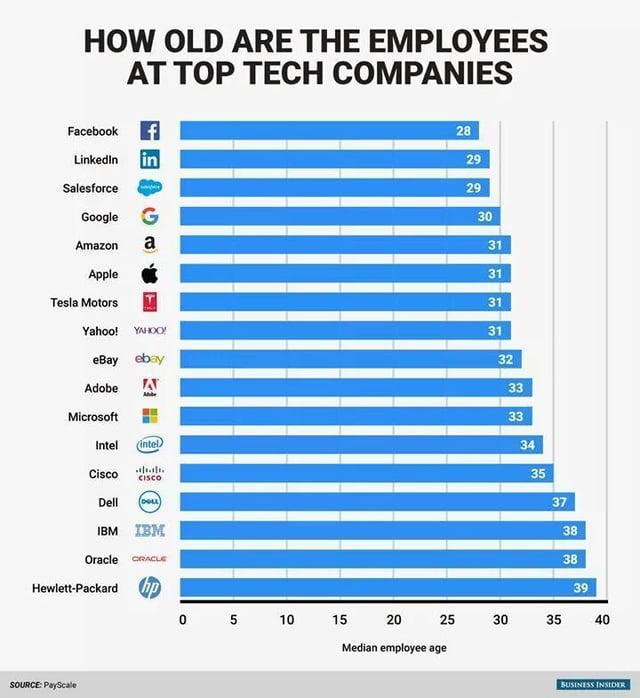 Let’s talk age discrimination. This is a highly charged way to start a blog post but the problem is real, the solutions are hard, and a lot of talent is not being recognized.
Let’s talk age discrimination. This is a highly charged way to start a blog post but the problem is real, the solutions are hard, and a lot of talent is not being recognized.
I am a big fan of the Kris Dunn blog The HR Capitalist. This blog provides some great insights and opinions on topics relevant to everyone in the human capital management space. I highly recommend it.
He recently wrote a provocative post that caught my attention: Sit Down Old People - I'd Hire You, But You're Not "Digitally Native"....
The level of age discrimination present today is alarming.
In his blog post, Kris Dunn references a Inc.com blog by Geoffrey James “The Unforgivable Sin in Silicon Valley: Being Gen-X”. In the blog James paints a bleak picture:
People would be rightly shocked if a job description for a high-tech position said: "whites and South Asians only" or "women need not apply." They'd be shocked not because racism and sexism aren't rampant in these firms, but because the company would be explicitly acknowledging that the racism and the sexism exists.
However, whilst they're sensitive about being outwardly racist and sexist, high tech firms are totally fine with discriminating against one type of job candidate: anyone born before 1985. To express this, high-tech firms use the dog-whistle "digital native" which basically means "nobody older than 36 need apply." Here's an example from the Mountain View-based TapInfluence:
"As an Influencer Marketing Accounts Coordinator, you are an eager and ambitious can-do-er. You are bright, creative and won't stop until both you and your customers (marketers and influencers) are successful. You are a digital native who loves everything about social media and who keeps up with all the rising social trends." (Emphasis mine.)
FYI, a digital native as defined by Wikipedia is:
The term digital native describes a person that grows-up in the digital age, rather than acquiring familiarity with digital systems as an adult, as a digital immigrant.
Importantly, being a digital immigrant is not a good thing. In tech companies, this is seen as being out of touch and not being able to perform at peak productivity versus younger workers who never known a world without the internet.
The facts do not support that digital natives are any more productive than the so-called digital immigrants. Consider this opinion by Martin Weigel “Just because you think you’re a ‘native’ doesn’t mean you’re smarter”.
The idea of digital nativism not only treats an entire generation as one homogeneous mass, but it assumes that all of it is possessed of familiarity and mastery. They have nothing to learn. They already know it.
Now so-called ‘digital natives’ have plenty of practice at using certain forms of technology – say, using Snapchat or Instagram. They may be versed in the rites, rituals, unwritten codes, and rules that can come with these platforms. But that familiarity does not automatically confer upon them a mastery of technology in all its forms and all its applications. After all, I can hold a pen and write. But that does not mean that I am qualified and capable as a screenwriter, newspaper columnist, poet, author, speech writer, or novelist.
Tasking this a step further, Maren Hogan of Red Branch Media shared this observation in her recent weekly newsletter:
Startups worship the young. From 40 Under 40 lists to young entrepreneur groups that cater almost exclusively to those who still have a skip in their step, it feels like post 45 or so is when the bloom starts to fall from the rose for many startups. However, research shows that innovation shows up strongest at around 47, and many inventors do their best work at later stages in their careers.
The study found that the overall median age of innovators was 47 years old. Only 5.8% of the sample—which ranged in age from 18 to 80—was 30 years or younger, and innovation peaked between the ages of 46 and 50. The rate of innovation continues to be very high until the age of 55 and declined sharply after 65, the median expected retirement age in the US. (QZ)
This takes us back to why is age discrimination taking place?
First is that the tech-based firms believe that there is a difference. This chart shows the average age of employees at the major tech firms. You will immediately see that there are no firms with an average age over 40.

This is allowed to continue by the not so subtle job recruitment shown above in the TapInfluence job posting or in a more insidious way as the following pro-forma diversity statement from Facebook, shows:
"As part of our dedication to the diversity of our workforce, Facebook is committed to Equal Employment Opportunity without regard for race, color, national origin, ethnicity, gender, protected veteran status, disability, sexual orientation, gender identity, or religion."
Geoffrey James points out that age has somehow been excluded from the diversity statement. He asked Facebook management for a clarification and has since been stonewalled.
The effect of this age discrimination is serious. James notes that:
According to a study of 1,011 currently employed U.S. tech workers released yesterday by the job-search company Indeed.com, inside high-tech firms:
- Only a fourth (26%) of employees are over 40.
- Almost half (43%) worry about losing their job because of their age.
- Almost a fifth (18%) worry about losing their job because of their age "all the time."
- Over a third (36%) have experienced at least one instance during which they weren't taken seriously by colleagues and managers due to their age.
The severity of this, the author of Disrupted Dan Lyons says, is that the vast wealth of knowledge accumulated by skilled older workers (and women and minorities) is lost on an industry that could really use some guidance.
“Technology is probably the most important industry in the world right now, and what they’re saying to the vast majority of the population is, “You have no place here. You don’t get a role in this wealth,'” Lyons said. “And that’s not right. That’s not progressive.”
My hope is that this situation is going to change. The missed opportunity of passing on the talent pool of professionals over 40 (or 50 for that matter) simply because they are digital immigrants seems like a waste to me. The tech firms need to address this on their own or someone is going to start to take corrective action on their own.
Need an idea of what this could be, read this interesting post HOW BIG TECH BECAME A BIPARTISAN WHIPPING BOY. Spoiler alert – Washington is taking a much closer look at Silicon Valley.
![]()



